
Reviewing the tech for content creators that has recently appeared on the market is not new for me, so I know well that selecting the best microphone for DSLRs is crucial for achieving decent recording quality.
As my job involves the creation of vlogs, interviews, and short films, I’ve tested a great variety of mics, including budget-friendly and high-end models.
Excellent camera-top mic for a DSLR

RODE VideoMic NTG is an ideal option for shooting different types of content like interviews, vlogs, or even more sophisticated film projects. This microphone for video recording is extremely user-friendly, versatile, and produces pro-level sound without any complications.
It is easy to attach the mic to the top of a DSLR, hook it up to my smartphone, or even use it to capture the sound off-camera. Thanks to auto-sensing 3.5mm output, I did not require any additional adapters or changes to settings when swapping between my camera and phone during the shoots. This is a considerable benefit for those working on the go like me.
When it comes to sound quality, it is stunning. The mic can record different types of audio including voices and ambient sounds with excellent clarity and tonality. I took advantage of it to capture the interviews in crowded places, and the result exceeded my expectations, as the speaker’s voice was fully isolated from the surroundings.
| Form: | Shotgun |
| Polar pattern: | Supercardioid |
| Type of mic: | Condenser |
| Frequency range: | 20 Hz to 20kHz |
| Connectivity: | 3.5mm TRS |
Amazing DSLR microphone for wildlife

I often use Rode VideoMic Pro for vlogs, small documentaries, and even dabbling in short wildlife films, as this model is very easy to install. You can attach the mic to any DSLR video camera equipped with a standard Hot Shoe mount, whereas the shotgun-style design allows focusing on the speaker right in front of you when shooting a vlog or interview.
The quality of sound is superior – the mic isolates separate voices even in very noisy environments. And its variety of sound customization options is what makes this model worthy of such a high price. The output gain can be easily tweaked with switches on the back. Moreover, this DSLR microphone for wildlife has a low-cut filter to decrease low-frequency noise.
Another reason why I like this noise cancelling microphone is a reliable and durable battery, which can work for up to 70 hours. It comes equipped with a foam windscreen but unfortunately, it is helpless against a strong breeze. So, if you are filming in windy weather, investing in a furry windjammer is a must.
| Form: | Shotgun |
| Polar pattern: | Supercardioid |
| Type of mic: | Condenser |
| Frequency range: | 40Hz to 20kHz |
| Connectivity: | 3.5 mm TRS cable & camera shoe mount with 3 / 8“ thread |
Ideal for pros

The Shure VP83F is one of those mics for DSLR cameras that might seem pricey at first, but once you start using it, you understand the reason for such a high price. This model combines the functionality of a super-cardioid condenser mic and audio recorder, which is convenient in many situations.
It came in handy for filming both indoor interviews and outdoor shoots, and the ability to tweak the gain depending on the environment eliminates much audio editing work. The high-pass filter is another highlight of this model – it decreases the low-frequency rumbles, which is beneficial in windy environments.
The shock mount on the VP83F is amazing as well. As this mic uses a Rycite lyre system, any handling noise is minimal. Shure even performed well during the handheld shooting, as it picked up virtually no movements. The microphone delivers a fantastic sound quality. However, it is not so rich in the lower frequencies if compared to other mics like the Rode VideoMic Pro.
| Form: | Shotgun |
| Polar pattern: | Supercardioid |
| Type of mic: | Condenser |
| Frequency range: | 50Hz to 20kHz |
| Connectivity: | 50Hz to 20kHz |
Wireless mic for vlogging with a small weight
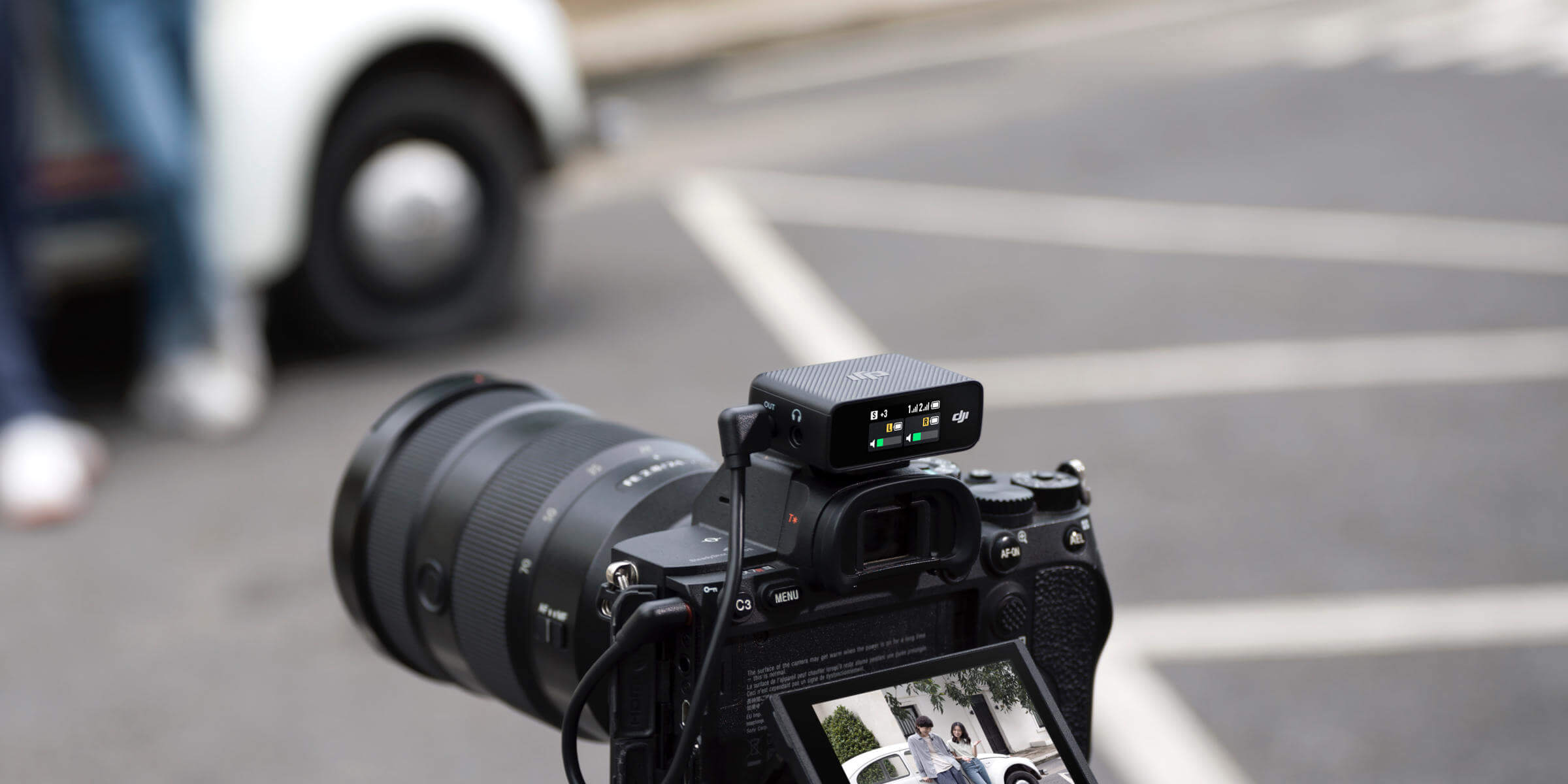
If you often shoot vlogs, interviews, or films, you will appreciate this sleek and easy-to-use DSLR wireless microphone. I like its small magnetic clips on the transmitters which allows attaching it to clothing effortlessly.
This omnidirectional mic for streaming delivers clear audio with a natural tone, and the sound consistency was maintained even when I was filming on the go. I was also impressed with its range. When using it on outdoor shoots, the 100-meter transmission range ensured no dropouts.
In addition, all the creators who prefer working on the go will appreciate its charging case, which allows storing the mic and charging the transmitters and receivers with ease. The only issue I had trouble with was the smartphone adapters that work perfectly but should be plugged in securely.
| Form: | Clip-on pack with charging case |
| Polar pattern: | Omnidirectional |
| Type of mic: | Pre-polarised pressure transducer |
| Frequency range: | 2400-2483.5 MHz |
| Connectivity: | 3.5mm TRS |
Perfect wireless mic kit for Sony owners

I like that the Godox Virso S kit is delivered all paired and ready to work right out of the box. You do not need to tinker with multiple settings or struggle to sync the device to start the recording. Besides, the package contains a charging carry case.
Godox Virso S offers a solid range. I tried it out in different environments, and the 200-meter line of sight range remained consistent all the time. I’ve also filmed in windy weather, and thanks to the windshields, the sound contained virtually no noise.
Sony users should definitely buy this DSLR microphone because of the better signal from the hot shoe connection. However, if you are looking for a microphone for Panasonic Lumix or other camera brands, the standard Virso M2 is another great option to consider.
| Form: | Microphone system |
| Polar pattern: | Omnidirectional |
| Type of mic: | Wireless lavalier |
| Frequency range: | 50Hz -18KHz |
| Connectivity: | 50Hz -18KHz |
Great for recording several sound sources

Although Rode Wireless Go II is not a cheap DSLR microphone, the quality and functionality of microphone for podcasting are definitely worth paying such a high price.
Once I conducted a photoshoot in a crowded city square, and due to the multiple wireless signals flying around, I experienced some interference. But my footage was not spoiled thanks to onboard recording. Then I synced the sound in post-production without any trouble. Such an ability is simply indispensable for all content creators.
It’s to my taste that this DSLR mic can be easily hooked up to a smartphone and other devices. To shoot vlogs, I even connected it to my GoPro, and managed to enhance the quality of sound considerably. Moreover, it is delivered with two transmitters, therefore this is a perfect solution for filming interviews or vlogs together with a friend.
| Form: | Clip-on pack |
| Polar pattern: | Omnidirectional |
| Type of mic: | Omnidirectional |
| Frequency range: | 50Hz-20KHz |
| Connectivity: | 3.5mm jack input; USB-C and iOS digital output |
Advanced wireless lav system
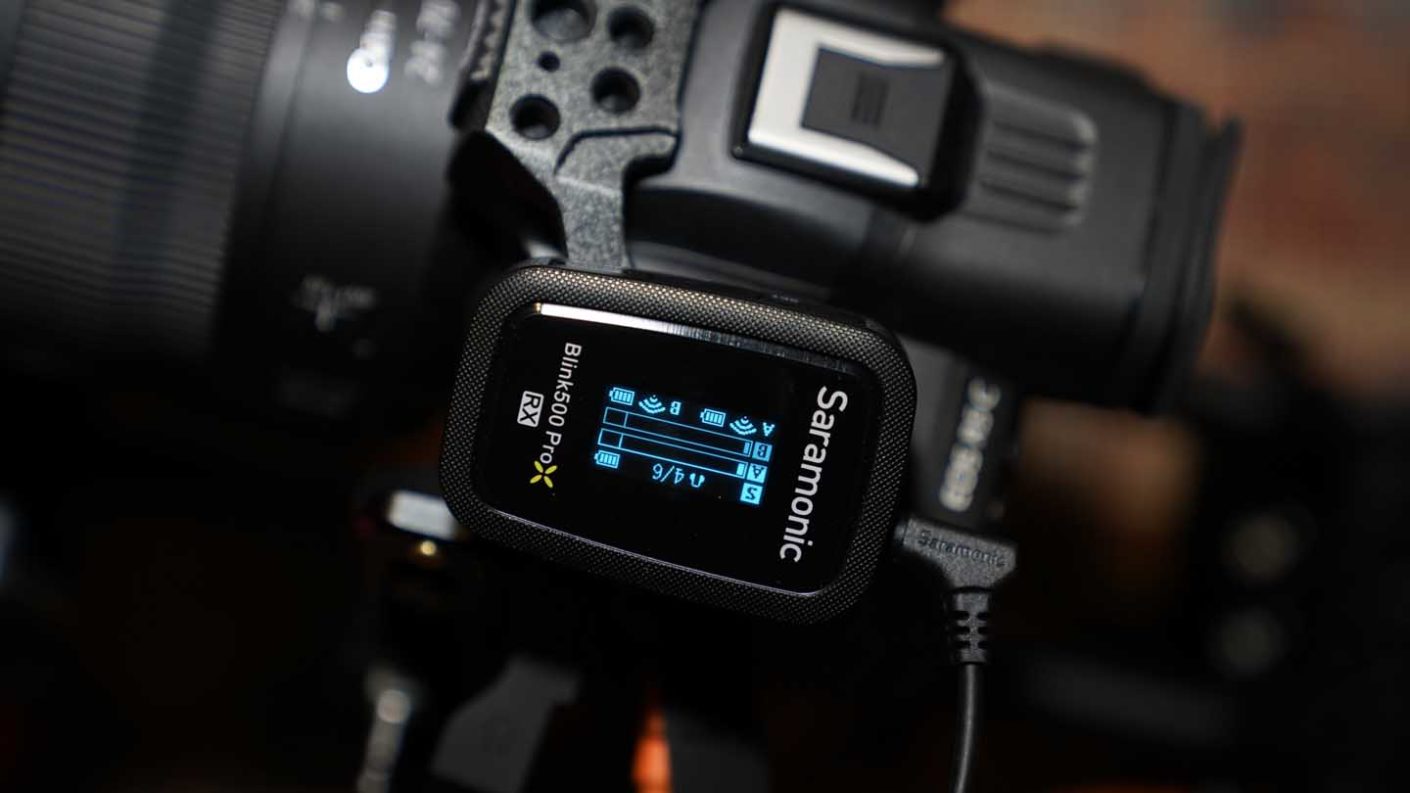
I have already used the original Blink 500 system, so when I had the luck to try out the Pro version, I was glad to see that the developers had added a 3000mAh charging case to the package. The impressive range of up to 100m with a clear line of sight is another highlight of this model.
I’ve tried out this DSLR mic in different locations, and even when filming outdoors, the quality of sound remained outstanding. For a vlogging microphone for DSLR, this range is more than just enough. I’ve used this model with both my DSLR for video and my smartphone, and the kit demonstrated excellent performance with both.
One of the biggest pluses for me was the upgraded built-in mics and the furry windshields. As I often shoot outdoors, wind noise can become a serious problem. And, with the Blink 500 Pro B2, wind noise was significantly reduced. Of course, nothing is perfect, so I experienced a tiny bit of audio latency, especially when shooting far from the receiver.
| Form: | Lavalier |
| Polar pattern: | Omnidirectional |
| Type of mic: | Condenser |
| Frequency range: | 50Hz-18KHz |
| Connectivity: | 3.5mm jack |
Compact, affordable, and has physical dials

Lark 150 is a real treasure for novices, as the price of the kit is not high, but its capabilities are really impressive. Everything from the carry case to the lapel mics makes this model a perfect wireless microphone for church. It is great that the mic is fitted with physical dials, so I don’t need to fiddle with settings on a tiny screen to adjust the levels.
The setup is intuitive. As the mic pairs with the frequency-hopping spread spectrum automatically, the system is always stable and reliable. Another feature that is worth your attention is Safety Track, which records a second track at -6dB. This is a lifesaver in situations when something unexpected happens during the recording.
The compact design of this system, which is even smaller than the Rode Wireless Go, makes it more appealing for me. Transmitters of this DSLR mic are hard to notice when clipped on, and the charging case is a real bonus.
| Form: | Clip-on pack |
| Polar pattern: | Omnidirectional |
| Type of mic: | Lavalier |
| Frequency range: | 20Hz-20KHz |
| Connectivity: | USB, 3.5 mm Jack |
Best DSLR mic under $100

Stepless gain control is the main reason why Deity D3 Pro is one of the best DSLR microphones under $100 for me. I can adjust the gain without trouble to achieve the desired audio without relying on the camera’s controls. Another positive aspect is a durable battery that can work for approximately 50 hours without recharge.
This mic for entry-level DSLR has an aluminum body and has a perfect design with the bump guard, which eliminates any accidental changes during a shoot.
Most importantly, it delivers premium-quality sound. Featuring a super-cardioid pickup pattern, the mic brings the focus to the speaker in front, so it is an ideal option for recording interviews, vlogs, or any scenario where you need crisp and focused audio.
| Form: | Shotgun |
| Polar pattern: | Supercardioid |
| Type of mic: | Prepolarized Condenser |
| Frequency range: | 50Hz – 20kHz |
| Connectivity: | XLR, 3.5mm Jack |
Plug-n-play budget wireless mic
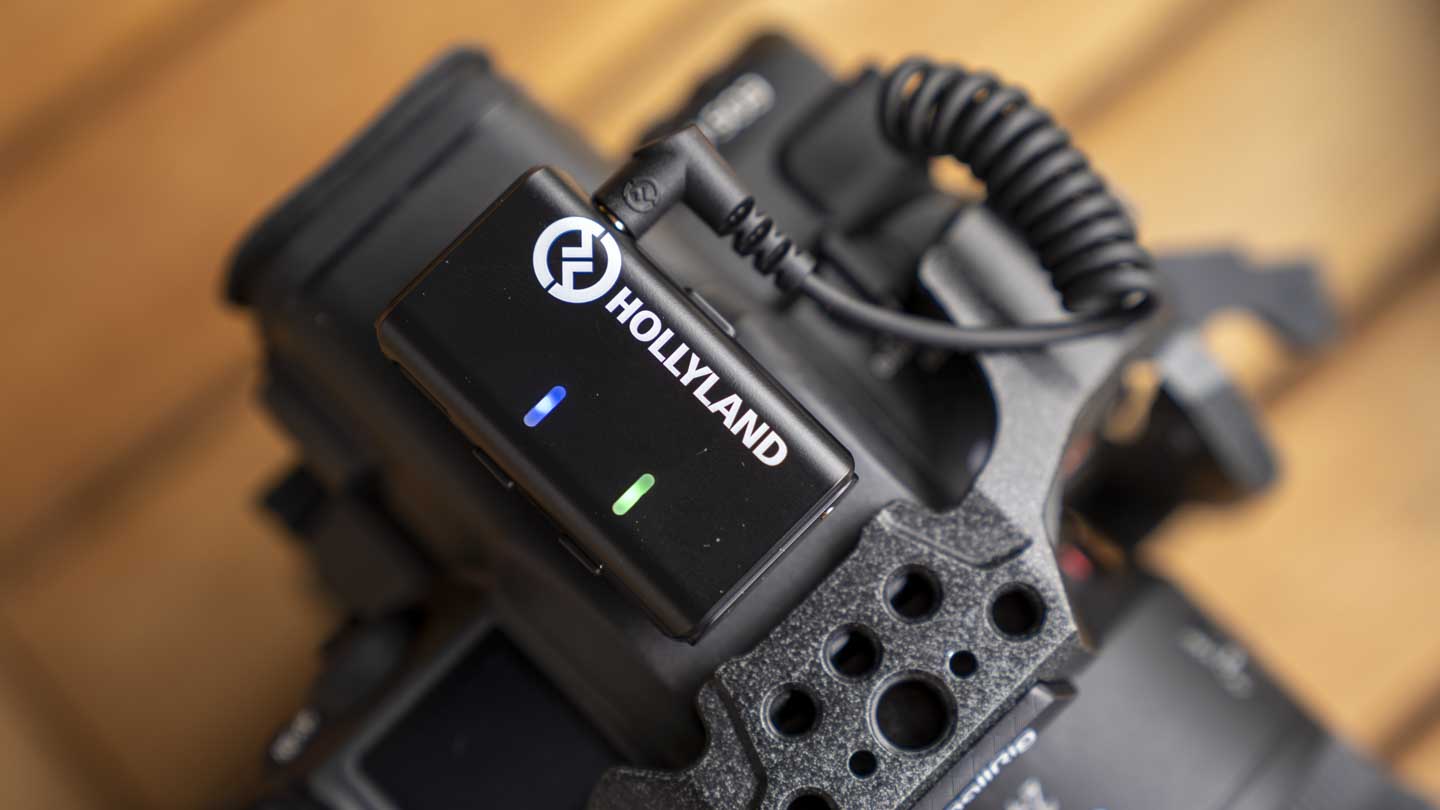
This is another microphone for Zoom meetings, which appeals to me with intuitive setup and the availability of the charging case. After unpacking the mics and receiver, they automatically pair without the need to tweak any settings.
Considering the price, the sound quality is outstanding. The noise-reduction feature, which is called HearClear, minimizes unwanted noise without disguising my voice, which I’ve experienced with other mic models.
This DSLR microphone has a decent range. While it might be not the best option for long-distance shoots, this model is just well for my vlogs and short films. There’s supposed to be a 20ms latency, but I did not notice it. Besides, I did not have to spend time synchronizing audio in post-production, so I managed to complete my project without any delay.
| Form: | Clip-on pack |
| Polar pattern: | Omnidirectional |
| Type of mic: | Lavalier |
| Frequency range: | 20Hz-20KHz |
| Connectivity: | USB-C or Lightning |
Compact and light
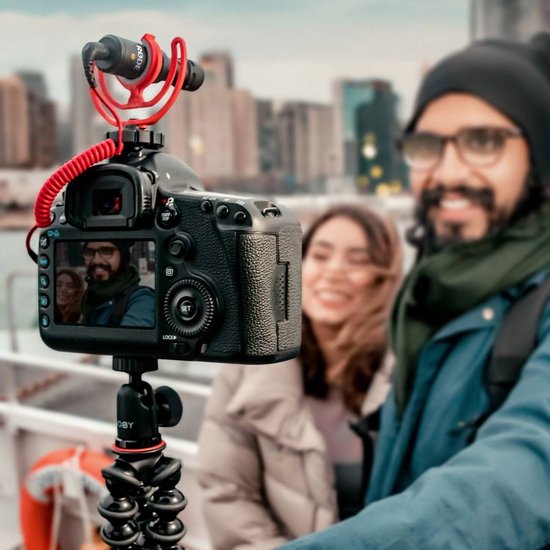
This cheap microphone for YouTube is great for shooting vlogs and short films because of its compact and lightweight design. I also chose this model as my backup DSLR mic, as it fits easily into any kit and is easy to carry around.
Although this mic is quite small, it has the power to deliver stunning audio quality. One of the pluses of the VideoMicro is that it does not need a battery as it uses the camera’s plug-in power.
Other advantages for me are the new ‘Helix’ isolation mount and the integrated Rycote Lyre shock mount. Thanks to them, I did not notice any unwanted vibrations or handling noise in the recording. I’ve benefited from these features during the handheld shooting, and I’ve been stunned by the extremely low amount of noise in the footage especially if compared to other mics in this price range.
| Form: | Shotgun |
| Polar pattern: | Supercardioid |
| Type of mic: | Condenser |
| Frequency range: | 100Hz – 20kHz |
| Connectivity: | 3.5mm TRS |
Greatest budget camera-top microphone for a DSLR
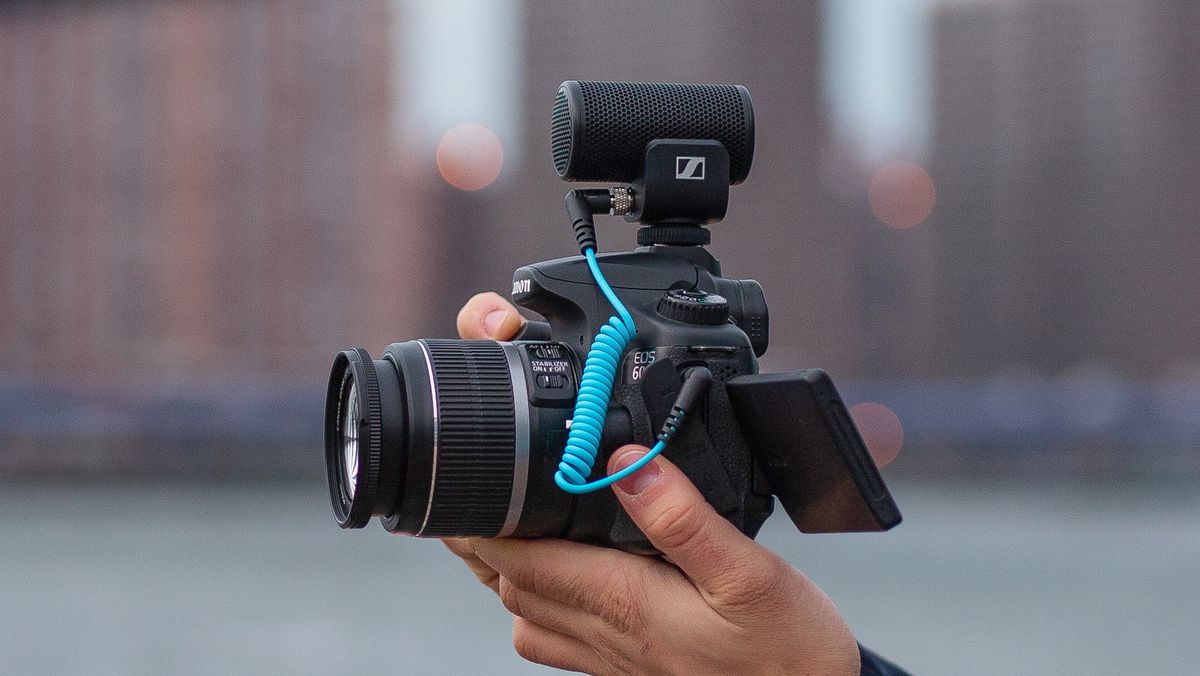
MKE 200 is a universal microphone. Whether I’m using it with my DSLR or my smartphone, it consistently delivers rich, clear audio. In addition, cables for both camera and mobile are included in the set.
I often take this cheap DSLR microphone to shoot vlogs or capture on-the-go sound, as it uses a super-cardioid pattern focusing on the sound source in front of it. This is the reason why the recordings feature virtually no background noise. It appeals to me that this model lacks a bulky external shock mount, offering integrated shock protection instead. This makes the setup not so cumbersome.
The MKE 200 is a bit pricier than alternatives like the Rode VideoMicro, but considering the durability and design of this mic, I feel like it’s worth the extra cost.
| Form: | Unidirectional |
| Polar pattern: | Super-cardioid |
| Type of mic: | Condenser |
| Frequency range: | 40Hz ~ 20KHz |
| Connectivity: | 3.5mm TRS/ TRRS |
Perfect budget shotgun mic

The Movo VXR10-PRO has been a great and affordable DSLR mic for different shoots, and it’s hard to beat considering the advantages it offers. This is a plug-in-only mic, meaning that you only need to connect it to your device using a simple jack and that’s it.
I like that it has both foam and furry windshields to minimize extraneous noise on recordings, as well as a headphone monitoring port. Although this microphone comes with a removable shock mount, it still does a good job of decreasing handling noise while vlogging and during quick run-and-gun shoots.
| Form: | Shotgun |
| Polar pattern: | Supercardioid |
| Type of mic: | Condenser |
| Frequency range: | 20Hz to 18kHz |
| Connectivity: | 3.5mm TRS and TRRS cables |
Directivity. The choice of directivity characteristics depends on the environment, where you are going to record videos. The best DSLR microphone is a cardioid or super-cardioid model that minimizes noise.
The hyper-cardioid pattern picks up signals from the sides and back. Such microphones are great for recording musical instruments, and documentaries and can come in handy in a room with a low noise level.
Size. Choose the size of the microphone according to your needs. Short microphones catch more noise from the sides and back than long ones. They are usually used to record videos indoors. Long microphones have high directivity and a wider range of frequency characteristics. With such a microphone, you can record from a bigger distance or using a tripod.
Battery life. To make sure that the mic can endure the whole recording session, you should check its battery capacity. If you often shoot far from the power source, investing in a microphone that has a long-lasting battery would be a smart decision.
Condenser or dynamic. Condenser mics are perfect for capturing high-frequency sounds, especially live music in studios. These models are not so durable and should be connected to a power source to run.
If you need to record loud sounds in places with much background noise, then a dynamic range mic would be a better fit. It is great that dynamic mics don’t need a power source to work.
Mounting style. This I a key factor you need to consider when determining how your podcast can be recorded. Some mount styles are preferable for specific types of recordings. For example, a lavalier mic is better for filming an interview. It is crucial to check your DSLR jack to make certain the mic you select can actually fit in it.
Frequency response range. A mic’s frequency determines the range of sounds, the device can capture and reproduce. In addition, a mic’s frequency response has a considerable influence on the quality of the sound it delivers. On average, the frequency ranges between 20 Hz and 20kHz but some models cut out low frequencies or higher frequency sounds to improve the quality of sound.